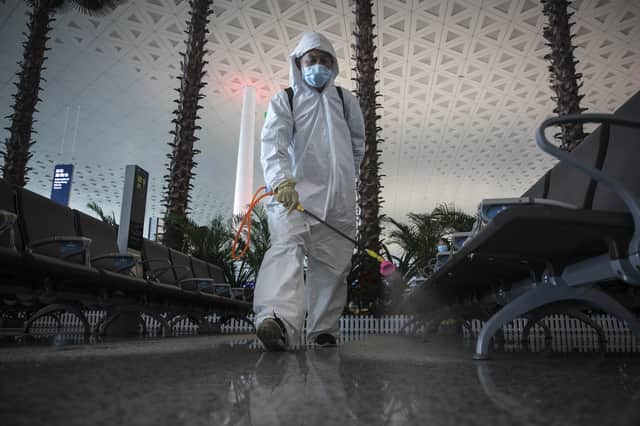Canon Ian Ellis: ‘In a crisis such as this we can take heart from the message of Good Friday’


The finding was highlighted in a recent article for Religion News Service by the founder and director of the Humanitarian Disaster Institute (HDI) at Wheaton College in Illinois, Jamie Aten.
However, he went on to point out that studies of reactions to the Ebola outbreak and the Syrian refugee crisis have shown that a lot depends on the kind of religion.
Advertisement
Hide AdAdvertisement
Hide AdHe draws a distinction between ‘extrinsic’ and ‘intrinsic’ religiosity. The former is the kind of religion that is primarily focused on one’s own emotional security while the latter is more focused on seeking actually to live out beliefs and religious principles in day to day life.
In a study of responses to the Ebola crisis, the HDI found that those who were highly “extrinsic” in their religion were more inclined to be fearful, being especially likely to experience Ebola reminders as “an existential threat that intensified national security concerns”.
On the other hand, those who were religiously highly “intrinsic” were less fearful and had lower levels of concern on issues such as national security.
Similar results followed from the HDI study of the Syrian refugee crisis.
Advertisement
Hide AdAdvertisement
Hide AdFrom all of this, Aten, writing at the beginning of this month, concluded that the HDI’s findings suggested that “if the coronavirus continues to spread in the US over the coming weeks and months, we can look for a significant swath of Americans — especially those more motivated by an externalized faith — to feel more threatened by the outbreak, and to translate that into discrimination against groups they perceive as different”.
It is not fanciful to suggest that such an analysis also needs to be borne in mind on this side of the Atlantic.
The unfolding coronavirus situation has been at the forefront of all our minds and for me not least because my own daughter-in-law comes from China, although not from Hubei province where it initially took hold.
Through her, I have met so many other kind and courteous Chinese people, both here in Northern Ireland and in China itself.
Advertisement
Hide AdAdvertisement
Hide AdOne thing that naturally concerns me is that Chinese people in our community should not be subjected, in light of the coronavirus situation, to any ill treatment simply because they are Chinese. In fact, so many Chinese living in Northern Ireland contribute so much to the community.
In connection with last September’s launch of that month’s China Cultural Programme, the head of the Northern Ireland Civil Service, David Sterling, spoke of how the Chinese community “has enriched life here in Northern Ireland”. He said: “This programme is a celebration of how well the links between China and Northern Ireland have developed over the years. But it is also an opportunity to look forward to the future, and see how we can continue to strengthen that relationship.”
It is instructive also to recall the words of Mme Zhang Meifang, Chinese Consul General in Belfast, who said: “I am delighted with the growing relationship between China and Northern Ireland and remain optimistic about the potential to develop our connections further.
“I appreciate greatly the enthusiasm and the welcome we have received from the people of Northern Ireland and from government officials, the Northern Ireland Civil Service, local government representatives and so many others working in the fields of academia, business and culture. We live in a closely connected world; we are committed to building a shared destiny, one of lasting peace, harmony, mutual development and prosperity.”
Advertisement
Hide AdAdvertisement
Hide AdThe cultural events in September 2019 marked several significant anniversaries: the 70th anniversary of the People’s Republic of China; the 65th anniversary of diplomatic relations between China and the UK; the 5th anniversary of the agreement to establish a Chinese Consulate General in Belfast; and the 5th anniversary of the Northern Ireland Bureau office in China.
The relationship between China and Northern Ireland can have a really bright future if we all truly are ready to look for the best in one another.
Yet, facing this crisis with all its threat to lives and livelihoods, with all the pressure it places on healthcare professionals and carers and with all the suffering and grief that it entails, the questions naturally arise in the minds of many: Where is God now? How can God allow this to happen?
There is no simple answer. There have been many books written about the problem of evil and why bad things happen, but none of those books provides a simple answer.
Advertisement
Hide AdAdvertisement
Hide AdI can only speak personally here, to say that in situations such as this — crises that have threatened and destroyed so many lives — I do take heart from the message that we will all shortly hear, the message of Good Friday, the message of Christ’s own agony.
Whatever the reasons one can suggest to answer those perplexing questions, at least with Christian faith we can feel the companionship of Christ as we travel through these deeply disturbing and distressing days.
• Canon Ian Ellis is a former editor of The Church of Ireland Gazette